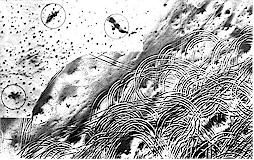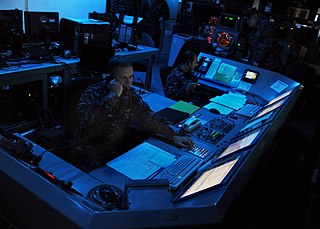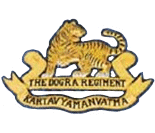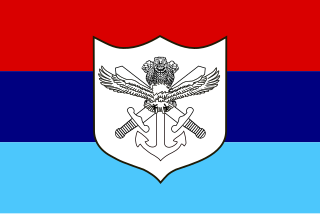
The Bangladesh Armed Forces are the combined military forces of the People's Republic of Bangladesh. It consists of the three uniformed military services: the Bangladesh Army, the Bangladesh Navy and the Bangladesh Air Force. The Armed Forces are under the jurisdiction of Ministry of Defence of the Government of Bangladesh, and is directly administered by the Armed Forces Division of the Prime Minister's Office. The President of Bangladesh serves as the Commander-in-Chief of the Bangladesh Armed Forces. It has the third-largest defence budget in South Asia and according to the Global Firepower index it is the third most powerful military force in South Asia. Border Guard Bangladesh and Bangladesh Coast Guard are under the jurisdiction of the Ministry of Home Affairs during peacetime, but during wartime they fall under the command of Bangladesh Army and Bangladesh Navy respectively.

The Indian Army is the land-based branch and the largest component of the Indian Armed Forces. The President of India is the Supreme Commander of the Indian Army, and its professional head is the Chief of Army Staff (COAS), who is a four-star general. Two officers have been conferred with the rank of field marshal, a five-star rank, which is a ceremonial position of great honour. The Indian Army was formed in 1895 alongside the long established presidency armies of the East India Company, which too were absorbed into it in 1903. The princely states had their own armies, which were merged into the national army after independence. The units and regiments of the Indian Army have diverse histories and have participated in several battles and campaigns around the world, earning many battle and theatre honours before and after Independence.

The Battle of Longewala was one of the first major engagements in the western sector during the Indo-Pakistani War of 1971, fought between assaulting Pakistani forces and Indian defenders at the Indian border post of Longewala, in the Thar Desert of Rajasthan state in India. The battle was fought between 120 Indian soldiers accompanied by four Hunter fighter aircraft and 2,000–3,000 Pakistani soldiers accompanied by 30–40 tanks.

The British Indian Army, commonly referred to as the Indian Army, was the main military force of the British Raj before its dissolution in 1947. It was responsible for the defence of the British Indian Empire, including the princely states, which could also have their own armies. As quoted in the Imperial Gazetteer of India, "The British Government has undertaken to protect the dominions of the Native princes from invasion and even from rebellion within: its army is organized for the defence not merely of British India, but of all possessions under the suzerainty of the King-Emperor." The Indian Army was an important part of the forces of the British Empire, in India and abroad, particularly during the First World War and the Second World War.

Military operations other than war (MOOTW) are military operations that do not involve warfare, combat, or the threat or use of violence. They generally include peacekeeping, peacebuilding, disaster response, humanitarian aid, law enforcement, arms control, deterrence, and multilateralism.

The 4th Gorkha Rifles or the Fourth Gorkha Rifles, abbreviated as 4 GR, is an infantry regiment of the Indian Army comprising Gurkha soldiers of Indian Gorkha or Nepalese nationality, especially Magars and Gurungs hill tribes of Nepal. The Fourth Gorkha Rifles has five infantry battalions. The regiment was raised in 1857 as part of the British Indian Army. In 1947, after India's independence, the Fourth Gurkha Rifles became part of the Indian Army as the Fourth Gorkha Rifles.

The Dogra Regiment is an infantry regiment of the Indian Army. The regiment traces its roots directly from the 17th Dogra Regiment of the British Indian Army. When transferred to the Indian Army like its sister regiments, the numeral prefix was removed. Units of the Dogra Regiment have fought in all conflicts that independent India has been engaged in, making it one of the most prestigious and most decorated regiments of the Indian Army.

The Pakistan Army, commonly known as the Pak Army is the land service branch and the largest component of the Pakistan Armed Forces. The President of Pakistan is the Supreme Commander of the Army. The Chief of Army Staff (COAS), a four-star general commands the army. The Army was established in August 1947 after Pakistan gained independence from the United Kingdom. According to statistics provided by the International Institute for Strategic Studies (IISS) in 2023, the Pakistan Army has approximately 560,000 active duty personnel, supported by the Army Reserve, the National Guard and the Civil Armed Forces. Pakistani citizens can enlist for voluntary military service upon reaching 16 years of age, but cannot be deployed for combat until the age of 18 in accordance with the Constitution of Pakistan.

General Krishnaswamy "Sundarji" Sundararajan, was the Chief of the Army Staff of the Indian Army from 1986 to 1988. He was the last former British Indian Army officer to command the Indian Army.

The Assam Regiment is an infantry regiment of the Indian Army. The regiment consists of 25 battalions: 17 regular battalions, 3 Rashtriya Rifles battalions, 5 Territorial Army battalions. It recruits exclusively from all the eight Northeastern states of India.

The Sri Lanka Army is the oldest and largest of the Sri Lanka Armed Forces. Established as the Ceylon Army in 1949, it was renamed when Sri Lanka became a republic in 1972. In 2010, the Army had approximately 200,000 regular personnel, between 20,000 and 40,000 reserve (volunteer) personnel and 18,000 National Guardsmen and comprises 13 divisions, one air-mobile brigade, one commando brigade, one special forces brigade, one independent armored brigade, three mechanized infantry brigades and over 40 infantry brigades.

The Indian Armed Forces are the military forces of the Republic of India. It consists of three professional uniformed services: the Indian Army, Indian Navy, and Indian Air Force. Additionally, the Indian Armed Forces are supported by the Central Armed Police Forces, Assam Rifles, Indian Coast Guard and Special Frontier Force and various inter-service commands and institutions such as the Strategic Forces Command, the Andaman and Nicobar Command and the Integrated Defence Staff. The President of India is the Supreme Commander of the Indian Armed Forces but the executive authority and responsibility for national security is vested in the Prime Minister of India and their chosen Cabinet Ministers. The Indian Armed Forces are under the management of the Ministry of Defence of the Government of India. With strength of over 1.4 million active personnel, it is the world's second-largest military force and has the world's largest volunteer army. It also has the third-largest defence budget in the world. The Global Firepower Index report lists it as the fourth most-powerful military.

Lieutenant General Dewan Prem Chand, PVSM was an Indian Army officer. He served as Force Commander of United Nations peacekeeping missions in the Democratic Republic of the Congo, Cyprus, Namibia and Zimbabwe.
Lieutenant General Chenicheri Satish Nambiar is a retired Indian general. He was the first Force Commander and Head of Mission of UNPROFOR, the United Nations Protection Force in the former Yugoslavia during 1992-93. He is the elder brother of former UN Under-Secretary-General Vijay Nambiar.
Indian Military Review (IMR) is an Indian defence monthly magazine. It was started by IDYB Group in December 2009. The first issue appeared in January 2010. It is published by IMR Media Pvt Ltd, part of the IDYB Group, which has been publishing military books since 1931. The Indian Defence Yearbook and Indian Military Review monthly magazine are the flagship publications of the IDYB Group. The Indian Military Review aims to stimulate the top brass intellectually and provides non-partisan analyses to middle level officers and is a source of information and learning for young officers.
Lieutenant General Syed Ata HasnainPVSM, UYSM, AVSM, SM, VSM & Bar is a retired General of the Indian Army. His last assignment in service was as the Military Secretary of the Indian Army. Prior to that, he commanded the Indian Army's 15 Corps in the state of Jammu and Kashmir, amongst other appointments. He has also commanded 21 Corps (Strike). In 2018, General Hasnain was appointed Chancellor of Central University of Kashmir.
Ashok K. Mehta is a former major general of the Indian Army, as well as a radio and television commentator and a columnist on defence and security issues. He was a founding member of the Defence Planning Staff in the Indian Ministry of Defence. He is also the elder brother of the renowned journalist and editor, Vinod Mehta. Ashok Mehta is married to journalist Aditi Phadnis.

Lieutenant General Kamal Jit Singh, PVSM, AVSM & Bar is a retired Indian Army officer and former general officer commanding-in-chief of Western Command. After retirement, he was conferred with Maharaja Ranjit Singh Chair of Excellence in Punjab University. and was appointed as Advisor to CM Haryana in November 2018. He graduated from the National Defence Academy, and attended various staff courses in training academies of the Indian Army throughout the country. Singh worked closely with UN Peacekeeping forces stationed in Angola and was commended by the chief and UN Force Commander during his tenure. He held several appointments as commanding officer and also staff appointments at the headquarters of the Indian Army. He has been twice awarded the Ati Vishisht Seva Medal. In 2019, Singh was appointed as State Information Commissioner. Inducted into Chandigarh Advisory Council in Aug 2019.{http://chdpr.gov.in/dashboard/?q=node/80506} He was nominated as Chairman of Education Standing Committee of UT Advisory Council on 28 Nov 2022.

The Integrated Defence Staff (IDS) is an organisation responsible for fostering coordination and enabling prioritisation across the different branches of the Indian Armed Forces. It is composed of representatives from the Indian Army, Indian Navy, Indian Air Force, Ministry of External Affairs, Defence Research and Development Organisation, Ministry of Defence and Ministry of Finance. The IDS is headed by Chief of Integrated Defence Staff along with Deputy Chiefs of Integrated Defence Staff. On December 24, 2019, the Cabinet Committee on Security (CCS) established the post of Chief of Defence Staff, a four-star general, a tri-service Chief, that shall lead the defence forces as well as play the role of head of the Department of Military Affairs. The body advises and assists the Chief of Defence Staff.

Apurba Kumar Bardalai, is a retired Major General from the Indian Army. He holds a PhD from Tilburg University, where he is a Member of the Department of Organisation Studies. He is also a Distinguished Fellow at the United Service Institution of India, New Delhi.















